

College Resources (Angela) McMahon Teachers LibGuilde to Multi-Cultural Resources (Brandon) Overview and Research Guides - Locating New Jersey Legislative History Materials Guide (Brianne) "A Legislative history is a compilation of the documents which express the purpose or intent behind the passage of a particular law.
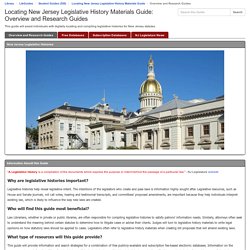
" - NJ Legislature website Why are legislative histories important? Legislative histories help reveal legislative intent. The intentions of the legislators who create and pass laws is information highly sought after. Legislative resources, such as House and Senate journals, roll call votes, hearing and testimonial transcripts, and committees’ proposed amendments, are important because they help individuals interpret existing law, which is likely to influence the way new laws are created.
Orchestral Auditions (Catherine) This guide is designed to help students pursuing a career as an orchestral musician navigate the audition world.
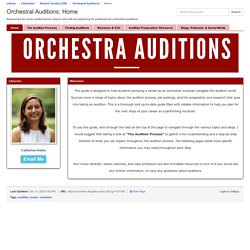
Sources cover a range of topics about the audition process, job postings, and the preparation and research that goes into taking an audition. This is a thorough and up-to-date guide filled with reliable information to help you plan for the next steps of your career as a performing musician. To use this guide, click through the tabs at the top of the page to navigate through the various topics and steps. I would suggest first taking a look at “The Audition Process” to gather a full understanding and a step-by-step timeline of what you can expect throughout the audition process. The following pages detail more specific information you may need throughout each step. Accessible Education: Resources and Support (Christina) Job & Career Resources (Dana) Sexual Health and Wellness (Dylan) Social Reading: YA Online Book Communities and Blogs (Gabby) Personas/Audience of the Guide: This guide is for both existing members of the online book community, as well as individuals who are mainly followers of this community.
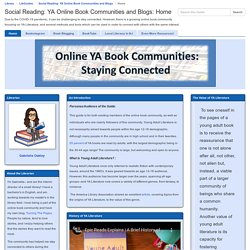
Young Adult Literature is not necessarily aimed towards people within the age 12-18 demographic. Although many people in the community are in high school and in their twenties, 55 percent of YA books are read by adults, with the largest demographic being in the 30-44 age range! The community is large, but welcoming and open to anyone. What is Young Adult Literature? Young Adult Literature once only referred to realistic fiction with contemporary issues, around the 1960's. The America Library Association shared an excellent article, covering topics from the origins of YA Literature, to the value of this genre. Guide to Speculative Fiction (Halie) Speculative Fiction is a vast and multidimensional genre, but one of its agreed-upon defining characteristics is that it is set in a world recognizable as (or very similar to, or a future version of) the one we collectively experience as reality, but with significant narrative elements that interrupt said reality.
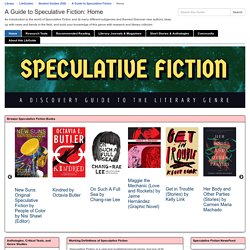
These "speculative" elements can exist in Horror, Supernatural, Fantasy, Science Fiction, and many other types of fiction. Often times, the landscape in a work of speculative fiction is under threat, whether it be from ecological disaster, evil forces, monsters, ghosts, magical corruption, aliens, totalitarianism, or an unexplained or unknown event that has otherwise altered the way humans live. Defining Speculative Fiction can be challenging and quite subjective, and tracking all of its development and specifications is likely a fool's errand, so I've embraced fluidity in this guide. Here are some experts in the field giving their take. Diverse Reads (Jackie) Rookie Journalist's Guide to Reporting (Jill) Philly College Prep (Jo) How does this site work?
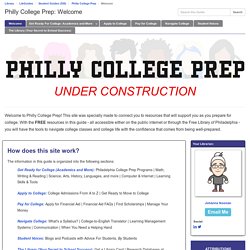
The information in this guide is organized into the following sections: Get Ready for College (Academics and More): Philadelphia College Prep Programs | Math; Writing & Reading | Science, Arts, History, Languages, and more | Computer & Internet | Learning Skills & Tools Apply to College: College Admissions From A to Z | Get Ready to Move to College Pay for College: Apply for Financial Aid | Financial Aid FAQs | Find Scholarships | Manage Your Money Navigate College: What's a Syllabus?
Student Voices: Blogs and Podcasts with Advice For Students, By Students The Library (Your Secret to School Success): Get a Library Card | Research Databases at Your Public Libraries | What's Research? There's a search bar in the top right of each page, and navigation links on the bottom of each page. You can access the resources in this guide for free! Finding the Right Career for Your Personality Type (Julia) Dungeons and Dragons (Kaley)
Diversity, Equity, and Inclusion in the Library (Laura) AP Government Final Project (Lauren M.) N.J Archaeology (Lauren R.) What is Archaeology?
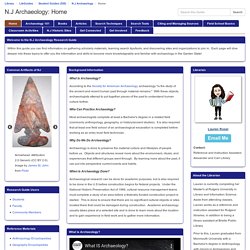
According to the Society for American Archaeology, archaeology "is the study of the ancient and recent human past through material remains. " With these objects, archaeologists attempt to put together pieces of the past to understand human culture further. Who Can Practice Archaeology? Most archaeologists complete at least a Bachelor's degree in a related field (commonly anthropology, geography, or history/ancient studies). It is also required that at least one field school of an archaeological excavation is completed before working as an entry level field technician.
Why Do We Do Archaeology? Archaeology is done to preserve the material culture and lifestyles of people before us. When Is Archaeology Done? Archaeological research can be done for academic purposes, but is also required to be done in the U.S before construction begins for federal projects. Librarians Welcoming All Elementary Students (Melaina) Skip to main content It looks like you're using Internet Explorer 11 or older.
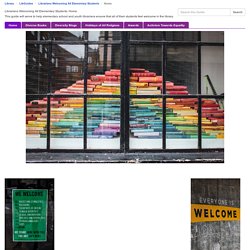
This website works best with modern browsers such as the latest versions of Chrome, Firefox, Safari, and Edge. If you continue with this browser, you may see unexpected results. Librarians Welcoming All Elementary Students: Home This guide will serve to help elementary school and youth librarians ensure that all of their students feel welcome in the library. Photo by Brittani Burns on Unsplash welcome Photo by Katie Moum on Unsplash Librarian Melaina Squicciarini.
Middle School Inquiry Projects (Rachel) Reaching for Reads:Readers' Advisory Guide for Teens & Parents(Riley) Online Content Creator/Social Media Influencer (Rosiris) Research an art song & lieder (Vincent)